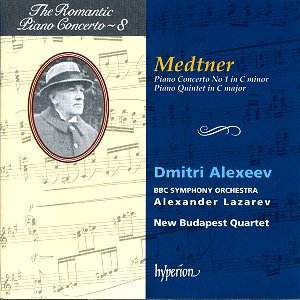As one writer said recently, Medtner’s time has certainly
come. This excellent follow-up to Hyperion’s award-winning disc of Concertos
2 and 3 is just as stimulating, musically and artistically.
Nikolai Demidenko plays with stunning virtuosity on the earlier disc,
and here his friend and fellow countryman Dmitri Alexeev dispatches
both these contrasting works with the same combination of Russian panache
and whirlwind brilliance. To be fair, it is the sort of playing that
Medtner’s music needs (and that he himself often provided) to really
make it work. In lesser hands, one will usually be left with the feeling
that so much of this is watered-down Rachmaninov (to paraphrase the
old chestnut). But given the advocacy of truly first-rate artists, there
is much to enjoy.
As so often with Hyperion’s thought-provoking booklets,
the artist (in this case Alexeev) has provided the words, and in the
process given us an insight into the creative process. He doesn’t mince
words, boldly stating that Medtner’s First Concerto is "probably
his most outstanding work". His performance certainly shows he
can put his money where his mouth is, and the sumptuous opening theme
is delivered with a real sweep and passion. Yes, one is put in mind
of Rachmaninov at times (the two were lifelong friends and admirers,
who each dedicated a concerto to the other), but it is usually limited
to the odd thematic allusion, some of the piano cadenzas, and the occasional
climactic point. Otherwise, one has to admire Medtner’s attempt at originality
in such a well-worn form. The piece is cast in a grand, single structure
and tied together by sonata form where, as Alexeev points out "the
extended development of each section compensates for the lack of traditional
division into movements". He certainly makes the most of markings
such as Abbandonamente ma non troppo, where a haunting,
improvisatory quality is achieved.
Introspection and daring are also qualities to be found
in the Piano Quintet, his last piece and the work Medtner regarded
as the synthesis of his life’s work. Instructions such as poco tranquillo
(sereno) and Quasi Hymn take us far away from the turbulence
of the First Concerto (written in the shadow of the Great War).
The piece has an inwardness and other-worldly quality that is strangely
uplifting, and the marvellous finale, with its tremolo glissandi,
is ethereal and uplifting.
Recordings are well balanced and wide ranging, with
detail crisp and clear. Lazarev and the BBC Symphony are sympathetic
partners in the Concerto, and in the Quintet the New Budapest
Quartet are as fully committed as Alexeev to Medtner’s cause. Recommended,
particularly to those with an interest in the ‘other’ 20th
Century.
Tony Haywood


